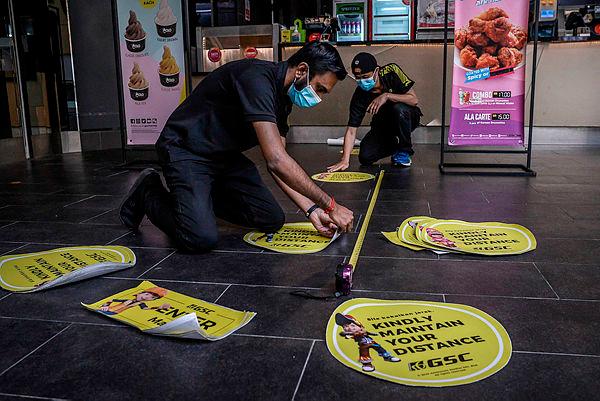PETALING JAYA: It is like a bad movie for cinema operators. Just when seats were beginning to fill up again, another round of the movement control order (MCO) brought the curtains down on them again.
For Golden Screen Cinemas branding manager Sharmine Ishak, it is disheartening that cinemas have to close for a third time despite having been stringent in enforcing the standard operating procedures (SOP), a sentiment likely shared by others in the entertainment business.
Sharmine pointed out that moviegoers were required to sit apart from each other and need to have their masks on throughout the entire duration of the screening unless they are eating or drinking.
“There is little interaction, as audiences are not talking when watching the movie,” he said, adding that this generally makes cinemas safe.
While movie fans will have to give the big screen a miss for an indefinite period, the operators are looking at huge losses in the near future.
Sharmine told theSun that in the 200 days of 2020 when screenings were banned, the industry incurred about RM500 million in losses.
“In previous years, movie theatre operators collectively made more than RM1.08 billion, and contributed RM250 million in entertainment tax,” he said.
In other countries such as Hong Kong, South Korea and Singapore, the government extended various incentives such as an entertainment tax waiver and wage subsidies to help cinema operators reduce their losses.
“A similar incentive can help us ride out this challenging period,” he said.
Penang has offered a waiver on entertainment duty until December 2021, the only state to have taken the initiative to help operators of entertainment outlets.
TGV Cinemas general manager of sales and marketing Mohit Bhargava said the closure of cinemas due to the MCO will have a negative impact on the livelihood of 20,000 Malaysians in the industry.
He said over the past year, cinemas have had to close and reopen several times and this had resulted in job losses as some cinemas have either downsized or closed down.
To underscore his view that cinemas were a safe place to be in, he cited a survey by Cinema Online Sdn Bhd, which showed that 98% of the 25,000 respondents were satisfied with the safety level during screening time.
Of those surveyed, 92% also equated visiting the cinema to dining out or visiting the malls, both of which were allowed until the MCO was enforced.
“We remain hopeful that the government will act favourably on our requests which have been shared with them through the Malaysian Association of Film Exhibitors,” he said.
The requests included a reduction or elimination of the entertainment tax, currently at 25% of the net ticket price, for the remainder of the year or until businesses recover across the nation; a governmental subsidy for production cost to encourage local filmmakers releasing their films in cinemas; and several others.
The Malaysian Employers Federation (MEF) said the government should reconsider its decision to close entertainment outlets such as cinemas.
MEF executive director Datuk Shamsuddin Bardan said such businesses depend on customer footfall to generate revenue.
“While businesses are generally allowed to continue operating under MCO 3.0, we expect the impact to be less severe than during MCO 1.0. However, after a long pause, cinemas were just starting to gather revenue,” he said.














